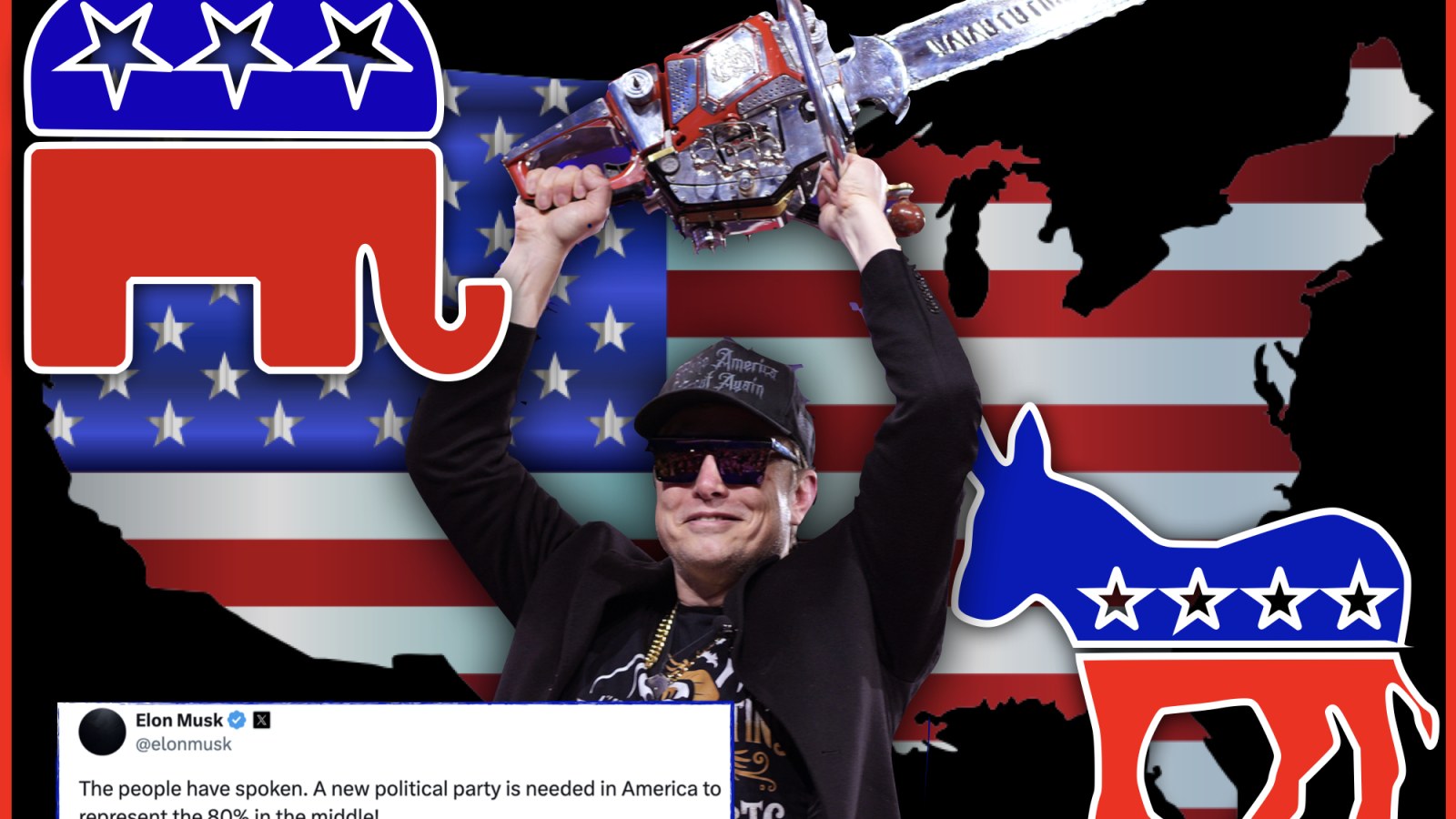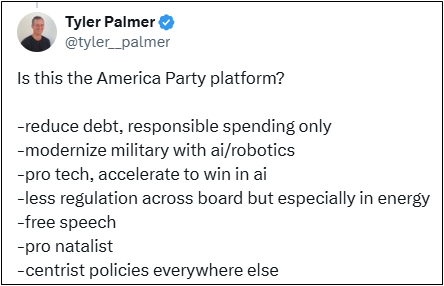After a public split with Donald Trump over the “Big Beautiful Bill,” Elon Musk launched the America Party in an effort to challenge the U.S. two-party system. While his shifting stance on China adds strategic ambiguity, the party serves as a stress test for American democracy in an era of polarization and gridlock.

Elon Musk, the tech titan who reshaped global industries from electric cars to space travel, is now betting his fortune and reputation on an even riskier venture: dismantling America’s two-party political system. Three weeks after a public feud with U.S. President Donald Trump over federal spending, Musk announced the creation of his own political party, the ‘America Party.’
The endeavour is in its nascent stages, and will have to undergo legal battles, fundraising scrutiny, and pressure from Trump. Additionally, third parties in the U.S. have long faltered under structural barriers including ballot access laws and lack of traditional funding sources. However, Musk’s vast personal wealth, control of social media platform X, and sway over tech elites may turn the ‘America Party’ into the first credible third-party threat in decades and catalyse deeper changes in the American political system.
Elon Musk’s Political Transformation
Elon Musk, the billionaire CEO of Tesla, SpaceX, and X (formerly Twitter), has undergone a dramatic political metamorphosis over the past three years. Initially a donor to both Democrats and Republicans, he pivoted decisively to align with conservative causes in 2024. He spearheaded what became the largest individual contribution to a presidential general election campaign in U.S. history, funnelling $288 million to Donald Trump’s re-election bid. This alliance earned Musk a short-lived role in Trump’s administration as head of the “Department of Government Efficiency,” where his push for radical austerity measures, including the abrupt closure of agencies like USAID, sparked bipartisan criticism and legal challenges.
Musk’s partnership with Trump collapsed in June 2025 with debates over the “One Big Beautiful Bill Act,” a sprawling Republican spending package Musk publicly condemned as fiscally reckless. On June 5, Musk ran a poll on X that asked respondents if they would support the creation of a third political party; 80.4 percent replied ‘yes.’ A second poll on July 4, following the passage of the ‘Big Beautiful Bill,’ garnered over 1.2 million votes, with 65.4 percent of respondents in favour of Musk creating the ‘America Party.’ A Quantus Insights poll from late June also showed that 40 percent of respondents were interested in a potential third party backed by Musk. On July 6, Musk officially announced that “the America Party is formed to give [Americans] back [their] freedom,” citing U.S. government “waste & graft” as the main motivation behind his decision.
A July 6 post on X (Figure 1) by user @tyler_palmer provided a sample platform for the America Party; Musk simply responded “Yeah!” He clarified in several other posts that the America Party would hold pro-Second Amendment and pro-bitcoin positions.

Figure 1. The expressed platform of the America Party as of July 6, 2025
Musk’s stated intention for the America Party is to run candidates for a small number of pivotal congressional races. He outlined plans on his social media account to concentrate resources on a limited number of these high-impact contests during the 2026 midterms, prioritizing 2–3 Senate seats and 8–10 House districts where the America Party could act as a decisive swing bloc in the narrowly divided chambers. While not ruling out running eventual presidential candidates, Musk emphasized that the next year would focus exclusively on congressional races, particularly targeting Republicans who supported the Big Beautiful Bill.
Musk on China
One of the things not directly mentioned in Musk’s political platform is China. For the majority of Trump’s second term, Musk was seen as a rare pro-engagement voice in Trump’s China-sceptic team. Tesla’s existential reliance on Chinese battery supply and consumer markets historically positioned Musk as a de facto ambassador for U.S.-China commercial détente. Former Chinese premier Li Keqiang even offered Musk a green card in 2019 following the opening of the Tesla Gigafactory 3 project in Shanghai.
Musk simultaneously champions isolationist proposals, such as withdrawing from NATO and the United Nations, that help to advance China’s vision for a multipolar world. Musk has also endorsed Beijing’s framing of Taiwan as an “integral part” of China, saying in 2022 that his “recommendation... would be to figure out a special administrative zone for Taiwan that is reasonably palatable [for both sides].”
But Musk’s new emphasis on military modernization and focus on “winning” in AI may signal a potential change in his views on China. His calls to modernize the military and dominate AI suggest alignment with more hawkish strategies. For Beijing, the America Party experiment presents both opportunity (a U.S. faction potentially opposing military aid to Taiwan) and risk (the threat of Musk’s desire for militarization of AI).
Next Steps for the America Party
To solidify its presence, The America Party must overcome a number of systemic barriers: formalizing its national party status, navigating costly legal battles to secure state-by-state ballot access, and establishing a grassroots support base, all while contending with resistance from entrenched bipartisan power structures. So far, Musk has not filed paperwork with the Federal Election Commission, nor has he taken any public legal steps to apply for ballot access.
However, recent precedents suggest such hurdles are surmountable with sufficient financial resources. Michael Bloomberg’s 2020 presidential campaign demonstrated that ballot access and organizational infrastructure can be rapidly purchased: The billionaire spent over 1 billion USD to quickly build a campaign infrastructure that rivalled or even surpassed that of his opponents. Musk’s wealth could similarly fast-track legal filings, fund state-level ballot qualification drives, and substitute organic grassroots support with targeted ad blitzes and paid field teams. Although Bloomberg’s bid was ultimately unsuccessful, he proved that financial firepower could override many traditional political barriers.
Musk also must contend with direct attacks from his former ally. Trump has publicly threatened Musk with retaliatory measures targeting both his businesses and immigration status. The Big Beautiful Bill has already shuttered several programmes that benefited Tesla, including electric vehicle tax credits. Trump could also target regulations that affect Tesla such as blocking approval for its experimental steering wheel-free robotaxis. He could also cancel Musk’s SpaceX contracts with the federal government, which would essentially destroy the company.
Most provocatively, Trump suggested he might challenge Musk’s citizenship, responding to questions about deportation by stating, “We’ll have to take a look”—a remark directed at Musk’s South African birth despite his U.S. naturalization in 2002. It is likely that Trump will not attempt to deport Musk because of Musk’s ability to hire top-tier legal counsel. Losing the deportation fight against Musk would set a legal precedent that could potentially overturn many of Trump’s other deportations of people with less access to legal resources—and Trump may not want to risk this. However, Trump, with his penchant for coercive economic policies, will almost certainly retaliate against Tesla and SpaceX.
Race Selection and Operative Recruitment
The America Party’s success will depend on two strategic imperatives: 1) Musk’s capacity to identify viable races where his influence could tip outcomes, and 2) his ability to demonstrate the viability of his unorthodox approach to party insiders.
Last December, Trump’s team identified four Republican Senators that were insufficiently loyal and are up for re-election in 2026: Joni Ernst of Iowa, Jim Risch of Idaho, Mike Rounds of South Dakota and Thom Tillis of North Carolina. At the time, Musk had threatened them with primary challengers on behalf of Trump, but he may now see these districts as ones to target with a third party—especially since, excepting Tillis, all the senators eventually capitulated and voted for the Big Beautiful Bill. In terms of the House of Representatives, Musk has more options, but he must consider that he isextremely unpopular amongst Democrats. If Musk chooses to run candidates for open seats in purple states, like North Carolina or Georgia, he is less likely to prevail than if he focuses on more heavily Republican-leaning districts or states.
For the America Party to function as more than a vanity project, Elon Musk must recruit seasoned political operatives who understand the granular mechanics of elections: fundraising mechanisms, campaign legal regulations, voter targeting, and campaign strategy. Historically, third parties fail to attract such talent due to financial instability and perceived futility. Other billionaire-backed political initiatives such as the Bloomberg campaign failed to recruit top talent even though wages were more than twice the industry average.
Yet, according to Axios, Musk has already gained tentative support from the Libertarian Party, former presidential candidate and fellow billionaire Andrew Yang, and a number of political consultants, including former Libertarian presidential candidate Gary Johnson's campaign manager and the “No Labels” coalition of politically moderate voters. Early success in recruiting these mid- or high-tier operatives would signal credibility, especially if Musk is able to convince Trump-sceptical GOP staffers to defect.
Potential Impacts
The America Party’s 2026 bids could unfold in three ways. An ineffectual launch would see Musk’s movement fail to recruit credible candidates or grassroots support, leaving the bipartisan dynamics mostly unchanged. A spoiler effect scenario would occur if the America Party siphoned enough conservative votes in swing districts, inadvertently handing control of the Senate or House to Democrats. Finally, if America Party candidates manage to secure pivotal seats in the tightly divided chambers, they will be granted outsized influence to broker deals on issues like tech regulation or spending bills in exchange for coalition support.
The mostly unlikely outcome would be the most disruptive. If Musk is successful, the ten or so representatives of the American Party would become “kingmakers” in American politics. Lobbying strategies would realign significantly, with expenditures flowing away from reliably predictable representatives from major parties and toward the small cohort of swing legislators whose votes on major bills remain flexible. The long-term viability of the America Party experiment then hinges on whether these kingmakers maintain loyalty to Musk’s priorities amid direct lobbying offers and grassroots pressure, whether rival billionaires come to see personal legislators as a new political imperative and rush to create their own parties, and whether established third parties like the Working Families Party or the Green Party can take advantage of cracks in the two-party system to increase their own influence.
A Stress Test for Democracy
Elon Musk’s America Party is more than a billionaire’s political gambit constructed out of personal grievance; it is a stress test for American two-party democracy. Whether the party flames out as a vanity project, tilts elections as a spoiler, or evolves into a kingmaker bloc, Musk’s experiment underscores an appetite for change in an era of polarization and gridlock. If Musk’s crusade against “waste & graft” resonates, it could catalyse a broader realignment of policy. Either way, the America Party may force a reckoning that has been a long time coming: Can 21st-century democracy thrive within 18th-century institutions, or will the system be forced to reinvent itself to survive? Musk’s answer, characteristically, is to light the rocket and find out.
